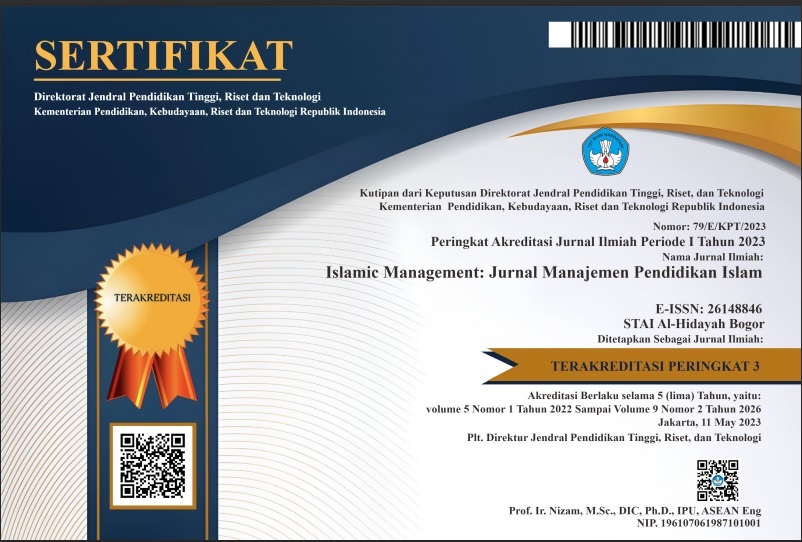INOVASI PEMBELAJARAN MELALUI BAI’AT DALAM MEMBENTUK KARAKTER KEDISIPLINAN PESERTA DIDIK
DOI:
https://doi.org/10.30868/im.v4i01.826Abstract
Education aims to develop the character of learners. To achieve this goal, teaching methods are necessary in education. So far, there has been no effective method applied in developing the character of learners. this research provides an overview of the level of discipline resulted from the ba’iat, as an effort to form the character of learners. It intends to find about how discipline is taught, implemented, and the supporting and inhibiting factors of the implementation of discipline as well as the impact of discipline teaching and implementation through bai’at in forming the character of learners. This research is based on a theoretical study which states that the implementation of discipline through bai’at can significantly improve discipline, and discipline is a key indicator of success in character formation. The success of learners in the formation of their character is, in some degree, influenced by the firmness of implementing the bai’at method. In this research, the author employed qualitative-descriptive method to find out how discipline is taught, how it is implemented, and what factors supportand inhibit the implementation and the teaching of discipline. The author also used quantitative method to determine the impact of teaching and the implementation of discipline through bai’at on the character formation of learners. The research was conducted at Pesantren Persatuan Islam 1 Bandung, and the respondents were 137 tenth grade Mualimien learners. The results of this study illustrate that the discipline teaching was in good category, with an average score of 3.562. The disciplinary implementation was also in good category, with an average score of 3.562. Then, the supporting and inhibiting factors were in the good category with an average score of 3.562. Finally, the impact of teaching and implementation of discipline through bai’at in the character formation of learners was in very good category, with an average score of 4.242. Thus, based on the results of the calculation, it is found that the teaching of discipline through bai'at has positive impact on the formation of the character of tenth grade Mualimien students of Pesantren Persatuan Islam 1 Bandung.
References
Arikunto, S. (2002). Prosedur Penelitian Suatu Pendekatan Praktek. PT. Rineka Cipta.
Danim, S. (2011). Pengembangan Profesi Guru. Kencana Prenada Media Group.
Fuad, D. H. (2018). PMA Bidang Kepeserta Didikan. D. H. Fuad, Pewawancara.
Hamalik, O. (1995). Kurikulum dan Pembebasan. Bumi Aksara.
Moleong, L. J. (2017). Metodologi Penelitian Kualitatif (Edisi Revisi). In PT. Remaja Rosda Karya.
Muhaimin. (1996). Strategi Belajar. CV. Citra Media.
Mulyasa, E. (2013). Pengembangan dan Implementasi Kurikulum. PT. Remaja Rosdakarya.
Musfiqon. (2012). Pengembangan Media dan Sumber Pembelajaran. PT. Prestasi Pustakaraya.
Muslim, A. (2018). Hasil Wawancara Responden: Orang Tua Peserta Didik. A. Muslim, Pewawancara.
Nurdiana, M., & Prayoga, A. (2018). Fungsi-Fungsi Manajemen dalam Kegiatan Ekstrakurikuler Pramuka di Madrasah. Madrasa: Journal of Islamic Educational Management, 1(1), 9–15. http://madrasa.id/index.php/madrasa/article/view/2/2
Nurdyansyah, & Fahyuni, E. F. (2016). Inovasi Model Pembelajaran. In Nizmania Learning Center.
Pembelajaran, M., Quran, T., & Prayoga, A. (2018). Manajemen pembelajaran tahfidzul quran berbasis metode yaddain di mi plus darul hufadz sumedang.
Pesantren Persatuan Islam. (2020). Teks Bai’at Peserta Didik 2019-2020. PPI Bidang Tarbiyah.
Prayoga, A. (2019). Manajemen Program Pembinaan Akhlak Karimah Peserta Didik Melalui Ekstrakurikuler. Jurnal Isema : Islamic Educational Management, 04(01), 93–104. https://doi.org/10.15575/isema.v4i1.5142
Prayoga, A., Jahari, J., & Fauziah, M. (2019). Manajemen Program Vocational Life Skill Pondok Pesantren. J-MPI (Jurnal Manajemen Pendidikan Islam), 04(02), 97–106. https://doi.org/10.18860/jmpi.v4i2.8093
Sahmudin, S., & Prayoga, A. (2019). Meningkatkan Kompetensi Pedagogik Pendidik Dalam Pembelajaran Melalui Supervisi Akademik. Al-Mau’izhoh, 1(2). https://www.jurnal.unma.ac.id/index.php/am/article/view/1673
Sugiyono. (2016). Metode Penelitian Kuantitatif, Kualitatif, dan R&D (24th ed.). Alfabeta.
Tu’u, T. (2004). Peran Disiplin pada Prilaku dan Prestasi Peserta Didik. Gramedia Widiasarana Indonesia.
Wena. (2009). Strategi Pembelajaran Inovatif Kontemporer: Suatu Tinjauan Konseptual Operasional. Jakarta: PT. Bumi Aksara.
Zakian, I. (2013). Pengaruh Motivasi dan Kompensasi Terhadap Kepuasan Kerja Serta Dampaknya Terhadap Kinerja Asatidzah di Mualimien PPI 2 Bandung. STIE Pasundan.
Downloads
Published
How to Cite
Issue
Section
Citation Check
License
Authors who publish with this journal agree to the following terms:
- Authors retain copyright and grant the journal right of first publication with the work simultaneously licensed under a Creative Commons Attribution License that allows others to share the work with an acknowledgment of the work's authorship and initial publication in this journal.
- Authors are able to enter into separate, additional contractual arrangements for the non-exclusive distribution of the journal's published version of the work (e.g., post it to an institutional repository or publish it in a book), with an acknowledgment of its initial publication in this journal.
- Authors are permitted and encouraged to post their work online (e.g., in institutional repositories or on their website) prior to and during the submission process, as it can lead to productive exchanges, as well as earlier and greater citation of published work (See The Effect of Open Access).






